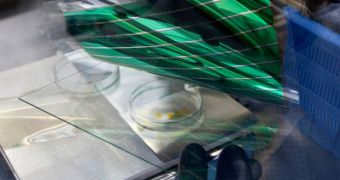Dresden, Germany-based startup Heliatek announces the development of an innovative solar panel design, which uses polyester films and small organic molecules for producing electricity from sunlight.
The devices are significantly more efficient at converting photons into electrons than existing technologies, but they currently cost more to produce. However, within 4 to 5 years, the company expects to drive prices per unit down by 40 to 50 percent.
Up until now, Heliatek has already gathered more than €28 million in funding from large corporations such as BASF and Bosch, but plans call for it to gather at least €60 million more. The money will be used to build a small, 75-megawatt factory to produce the new panels.
CEO Thibaud de Séguillon says that the reduced size of the original factory will account for much of the price difference between the new solar panels and existing devices. In time, this difference will decrease, until the Heliatek panels become cheaper, he adds.
The official reveals that the technology that underlies the company's solar panels is very similar to the one used to create organic light-emitting diode (OLED) displays for smartphones and TV sets.
One of the main advantages of using polymer films as a substrate is that the resulting solar panels are very light, and also flexible. This will enable engineers to incorporate them into structures that were previously off-limits to solar panels.
Additionally, the devices can operate in hot or cloudy conditions as well. Regular solar panels lose conversion efficiency when operating at high temperature, or away from direct exposure to sunlight.
Séguillon says that his company is currently talking to window manufacturers, trying to come up with a way of introducing these devices into regular windows for homes and offices. “It's like tinted windows, only these windows generate electricity,” he says, quoted by Technology Review.
By incorporating the solar panels in this manner, building developers will no longer have to fork out large sums for buying anchoring equipment to affix the panels on roofs. Having access to electricity-producing windows will be especially important for developers in Europe.
The European Union is currently considering legislation that will soon require each new building to produce at least as much energy as it consumes.

 14 DAY TRIAL //
14 DAY TRIAL //